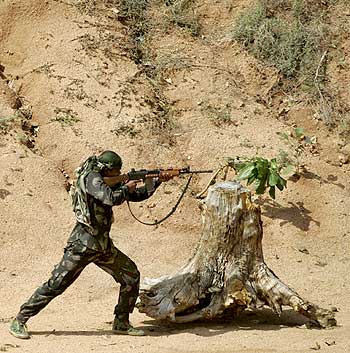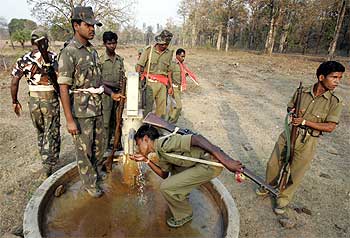 | « Back to article | Print this article |
New war against the Maoists
Despite losing six men -- including two high-ranking officers -- the security forces, who re-commenced their battle against the Maoist insurgency with renewed vigour recently, are buoyant.
Operation Red Hunt in Chhattisgarh is a psychological victory for the security forces who had been firmly on the backfoot in their fight against red terror.
This is the first time security forces have ventured into Maoist strongholds -- what the rebels call liberated zones. They destroyed an arms-manufacturing factory, their biggest success in recent times.
"It was known for many years that they had a factory in the region. And we had mounted several offensives in the past. But we never had the required penetration to reach the interiors. The Maoists would repel attacks quite easily and we suffered heavy losses," a senior intelligence officer told rediff.com
The officers know only too well how important the recent success is.
"The operation was planned to be carried out within 25 square kilometres, just like the Green Hunt operation in August. As many as 450 men of the Chhattisgarh police and 200 Cobras (the anti-Maoist fighting force) were part of the operation. From three sides we decided to attack five areas where we knew the Maoists were active: Burkhlanka, Pamlur, Palachalma, Yethrajbad, and Singamadagu," an officer said.
While two joint teams of Cobras supported by the Chhattisgarh police traveled to Yethrajbad and Singamadagu, three Chhattisgarh police teams were to take on the rebels in the other three villages.
'They will hit back at us with all their might'
"The operation was planned in an area where we have never gone before. This is exactly why, while it is a resounding victory for us, this operation is a crippling blow for the Maoists. They now know we are capable of going to places which we could never think of earlier. In that sense this operation has iconic value," the officer said.
The security forces believe more than a success in terms of actionable intelligence, this is a psychological victory.
"Intelligence was never a problem. The will to go and take them out in their stronghold was. We never had the capability or the will to go into those places," a senior intelligence officer said.
At the same time, the current success does not mean that the forces are going to walk all over the rebels in the days to come.
"We know a hundred places where they are concentrated. But we also know we are not capable of reaching all these places. This is just the start. We will hit them with far deadlier force in a year or two from now, when the forces are battle-hardened and are ready for the challenges," an officer, familiar with the Bastar region, said.
For now, the forces will concentrate on consolidating their gains.
"Now that we have hit them in the interiors for the first time, it is bound to worry them. They will hit back at us with all their might. There will be retribution. We will be extremely cautious when we make our next move."

